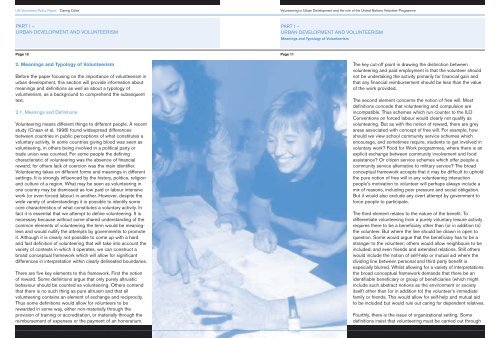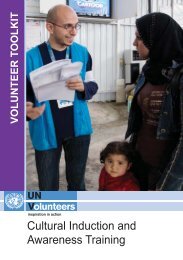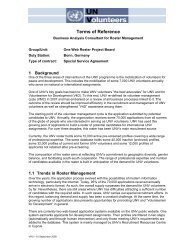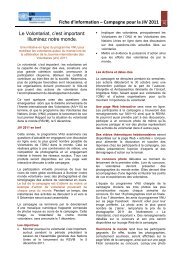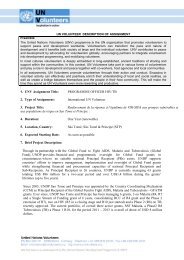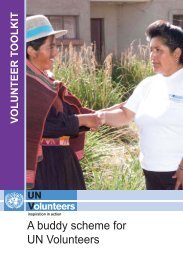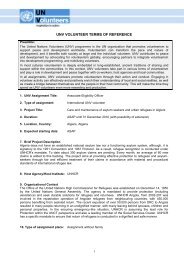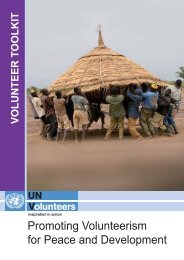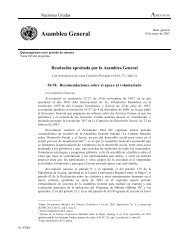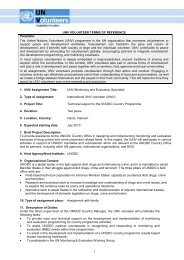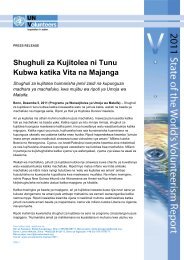View associated PDF document - United Nations Volunteers
View associated PDF document - United Nations Volunteers
View associated PDF document - United Nations Volunteers
Create successful ePaper yourself
Turn your PDF publications into a flip-book with our unique Google optimized e-Paper software.
UN <strong>Volunteers</strong> Policy Paper<br />
‘Caring Cities’<br />
Volunteering in Urban Development and the role of the <strong>United</strong> <strong>Nations</strong> Volunteer Programme<br />
PART I –<br />
URBAN DEVELOPMENT AND VOLUNTEERISM<br />
PART I –<br />
URBAN DEVELOPMENT AND VOLUNTEERISM<br />
Meanings and Typology of Volunteerism<br />
Page 10<br />
2. Meanings and Typology of Volunteerism<br />
Before the paper focusing on the importance of volunteerism in<br />
urban development, this section will provide information about<br />
meanings and definitions as well as about a typology of<br />
volunteerism, as a background to comprehend the subsequent<br />
text.<br />
2.1. Meanings and Definitions<br />
Volunteering means different things to different people. A recent<br />
study (Cnaan et al, 1998) found widespread differences<br />
between countries in public perceptions of what constitutes a<br />
voluntary activity. In some countries giving blood was seen as<br />
volunteering, in others being involved in a political party or<br />
trade union was counted. For some people the defining<br />
characteristic of volunteering was the absence of financial<br />
reward; for others lack of coercion was the main identifier.<br />
Volunteering takes on different forms and meanings in different<br />
settings. It is strongly influenced by the history, politics, religion<br />
and culture of a region. What may be seen as volunteering in<br />
one country may be dismissed as low paid or labour intensive<br />
work (or even forced labour) in another. However, despite the<br />
wide variety of understandings it is possible to identify some<br />
core characteristics of what constitutes a voluntary activity. In<br />
fact it is essential that we attempt to define volunteering. It is<br />
necessary because without some shared understanding of the<br />
common elements of volunteering the term would be meaningless<br />
and would nullify the attempts by governments to promote<br />
it. Although it is clearly not possible to come up with a hard<br />
and fast definition of volunteering that will take into account the<br />
variety of contexts in which it operates, we can construct a<br />
broad conceptual framework which will allow for significant<br />
differences in interpretation within clearly delineated boundaries.<br />
There are five key elements to this framework. First the notion<br />
of reward. Some definitions argue that only purely altruistic<br />
behaviour should be counted as volunteering. Others contend<br />
that there is no such thing as pure altruism and that all<br />
volunteering contains an element of exchange and reciprocity.<br />
Thus some definitions would allow for volunteers to be<br />
rewarded in some way, either non-materially through the<br />
provision of training or accreditation, or materially through the<br />
reimbursement of expenses or the payment of an honorarium.<br />
Page 11<br />
The key cut-off point in drawing the distinction between<br />
volunteering and paid employment is that the volunteer should<br />
not be undertaking the activity primarily for financial gain and<br />
that any financial reimbursement should be less than the value<br />
of the work provided.<br />
The second element concerns the notion of free will. Most<br />
definitions concede that volunteering and compulsion are<br />
incompatible. Thus schemes which run counter to the ILO<br />
Conventions on forced labour would clearly not qualify as<br />
volunteering. But as with the notion of reward, there are grey<br />
areas <strong>associated</strong> with concept of free will. For example, how<br />
should we view school community service schemes which<br />
encourage, and sometimes require, students to get involved in<br />
voluntary work? Food for Work programmes, where there is an<br />
explicit exchange between community involvement and food<br />
assistance? Or citizen service schemes which offer people a<br />
community service alternative to military service? The broad<br />
conceptual framework accepts that it may be difficult to uphold<br />
the pure notion of free will in any volunteering interaction<br />
people’s motivation to volunteer will perhaps always include a<br />
mix of reasons, including peer pressure and social obligation.<br />
But it would also exclude any overt attempt by government to<br />
force people to participate.<br />
The third element relates to the nature of the benefit. To<br />
differentiate volunteering from a purely voluntary leisure activity<br />
requires there to be a beneficiary other than (or in addition to)<br />
the volunteer. But where the line should be drawn is open to<br />
question. Some would argue that the beneficiary has to be a<br />
stranger to the volunteer; others would allow neighbours to be<br />
included, and even friends and extended relations. Still others<br />
would include the notion of self-help or mutual aid where the<br />
dividing line between personal and third party benefit is<br />
especially blurred. Whilst allowing for a variety of interpretations<br />
the broad conceptual framework demands that there be an<br />
identifiable beneficiary or group of beneficiaries (which might<br />
include such abstract notions as the environment or society<br />
itself) other than (or in addition to) the volunteer’s immediate<br />
family or friends. This would allow for self-help and mutual aid<br />
to be included but would rule out caring for dependent relatives.<br />
Fourthly, there is the issue of organizational setting. Some<br />
definitions insist that volunteering must be carried out through


